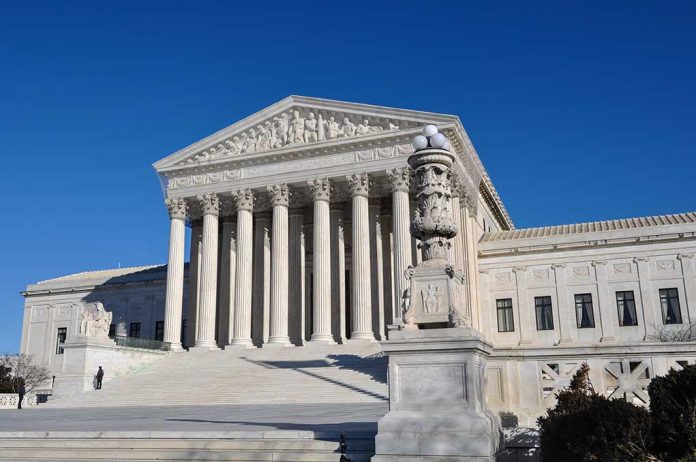
Supreme Court upholds Texas abortion ban, declining to intervene in emergency services dispute.
At a Glance
- Supreme Court refuses to hear Biden administration’s appeal on Texas emergency abortion case
- Texas remains the only state where federal emergency abortion guidance cannot be enforced
- Decision maintains Texas’s strict abortion ban, including in medical emergencies
- Texas Attorney General Ken Paxton hails the decision as a “major victory”
- Doctors express concerns over the law’s vagueness in medical emergencies
Supreme Court Declines Intervention in Texas Abortion Dispute
The U.S. Supreme Court has decided not to intervene in a dispute regarding emergency abortion services in Texas, effectively upholding the state’s stringent anti-abortion laws. This decision supports a lower court ruling that restricts the Biden administration’s ability to enforce emergency abortion provisions in the state, even when deemed medically necessary.
The case centers on the interpretation of the Emergency Medical Treatment and Labor Act (EMTALA), which requires emergency rooms to provide stabilizing treatment, including abortions if necessary to save a woman’s life or prevent serious harm. The Biden administration had sought to enforce this federal law in Texas, but the U.S. Court of Appeals for the 5th Circuit prohibited such enforcement.
The Supreme Court on Monday refused to require doctors in Texas to perform certain emergency abortions when the procedure would conflict with the state’s strict abortion ban. https://t.co/tpEUvO6GEG
— The Washington Post (@washingtonpost) October 7, 2024
Texas Celebrates, While Critics Voice Concerns
Texas Attorney General Ken Paxton celebrated the Supreme Court’s decision as a “major victory” for the state’s pro-life stance. The ruling leaves Texas as the only state where the Biden administration cannot enforce its interpretation of EMTALA regarding emergency abortions.
However, this decision has raised concerns among medical professionals and abortion rights advocates. Complaints have increased about pregnant women in medical distress being turned away from Texas hospitals due to the abortion ban. The Texas law does provide some exceptions for abortions if a pregnant patient’s health is at risk, but doctors have criticized the law as vague and unclear.
Political Implications and Future Challenges
The Supreme Court’s decision comes at a crucial time, with abortion rights emerging as a key issue in the upcoming presidential election. Democratic figures, including Vice President Kamala Harris, have sharply criticized the outcome and reaffirmed their commitment to restoring abortion rights nationwide.
While the Texas Supreme Court has ruled that doctors do not need to wait until a woman’s life is in immediate danger to perform an abortion, uncertainty remains. The state’s medical board has not specified which conditions qualify for exceptions, leaving many doctors concerned about potential legal repercussions.
As the national debate on abortion rights continues, this decision underscores the complex legal landscape following the overturning of Roe v. Wade in 2022. With Texas maintaining one of the strictest abortion bans in the country, the focus now shifts to how other states and the federal government will respond to similar challenges in the future.













